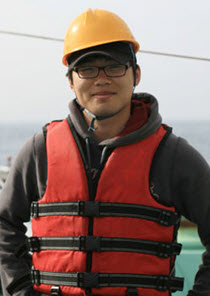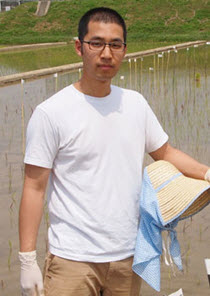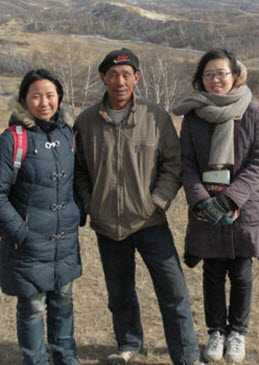Fighting against a wild sea on a rolling boat, harvesting rice at a rice field near SNU’s campus in Suwon, and trying to figure out the links between desertification and human civilization out in the desert, SNU students, for whom nature is their laboratory and research partner, are filled with academic curiosity.
Crisscrossing the East Sea with Academic Desire

PARK Jae Hyung (pursuing a master’s degree in SNU’s Department of Earth and Environmental Sciences)
Off the coast of Dokdo in the East Sea, the following can be found: the Ulleung Basin, waves reaching 3 meters high, a marine research ship named the Tamyang, and a group of students studying the sea. Mr. PARK is completely occupied day and night with observing sea currents and collecting data for his research about dynamics in sea currents. “We research the movement of seawater, which includes especially the heat storage capacity of the sea, changes in the ocean caused by climatic change, and changes in sea water temperature. Having only about 4 or 5 times a year at which it is possible to conduct such research on the sea, we should collect as much data as possible to get optimal results from our research."
Life on the sea matches perfectly both his strong interest in physics and his dynamic personality. “Shipboard Training Course in Oceanography" requires a demanding schedule of visiting 18 observation points in five days and four nights. Though the oceanographic observation operated in two or three shifts makes the participants totally exhausted, Mr. PARK says that it is far better than just sitting in a lab and struggling with numbers.
Among the students from about 10 different universities across the country making use of the practice ship the Tamyang, SNU students are well known for their enthusiastic attitudes according to the crew members of the Tamyang. “I feel a stronger attachment when conducting a study based on the data which were collected by me rather than the data which former researchers have already published in a book," said Mr. PARK. “Oceanographic observation is similar to mountain climbing. When we get on the top of a mountain, everything appears very tiny. When I’m on board in the open sea, my mind becomes broader. I would have given up conducting research, if all I had to do was just stay in laboratories. Thanks to the sea becoming another lab of mine, I can concentrate on my studies again today."
"I’m a Student and Farmer: I Work during the Day and Study at Night"

KOO Bon Hyuk (pursuing a master’s degree in SNU’s Program in Crop Science and Biotechnology in the Department of Plant Science)
One day in April, when the spring sunlight was getting hotter, rice planting was at its height, near the SNU campus in Suwon, where SNU’s College of Agriculture and Life Sciences was once located. Taking a good and close look at the faces of the workers, we have surprisingly found that they were baby-faced young SNU students rather than elderly farmers. They were graduate students from the Department of Plant Science.
KOO Bon Hyuk, a student majoring in Crop Science and Biotechnology in the Department of Plant Science, is studying rice. In just 2 semesters since he entered into graduate school, he seems like the image of a typical farmer. As if he were a person making his livelihood by farming, Mr. KOO plants rice very well. The total area of rice paddies which should be cultivated this year approaches 300 pyeong. In the middle of May, nearly for an entire week, all the students at the laboratory came to Suwon and went out to plant rice. “We have to visit the farm at least every other day even if it’s not the season for planting rice. During our busy seasons I had to irrigate, weed, and spray agricultural pesticide during the day in Suwon and study at night back at the Gwanak Campus. I often imagine how my life could be different if the farm were at Gwanak. Ha Ha," said Mr. KOO.
Rice is a fruit born after the blooming of a flower. Thus, harvesting it is in inseparable relation to the blooming stage. Mr. KOO researches the very genes controlling the time of blooming. At the fork of a road in selecting his major in graduate school, he was strongly attracted by rice, which is the most important food for human life in Asia.
This year the goal of his research is to find out the relationship between the genes controlling blooming stages and the quantity of fruits produced. He is worrying about the possible uselessness of his ultimate research on “double-cropping," in the case of yield decrease caused by genetic manipulation. The number of crops set for this year’s research reaches 10,000. Figuring out the quantity of rice yield accompanies counting rice grains one by one, which takes great time and effort.
The fact that rice grains differ in size and weight depending on their genes stimulated his curiosity. “I am so happy to be able to grasp both my health and studies by exposing myself to the wind and having a walk on the soil in the farm," and added “We also enjoy a ‘rice triathlon’ including long jump and shovel throw," with a big smile on his face.
The Desert Is My Own Lab

LEE Sun Hwa (doctoral candidate in SNU’s Department of Anthropology)
Ms. LEE went all alone to Inner Mongolia to conduct research on a serious worldwide environmental problem, --desertification--, on which previous studies were insufficient. A sheer curiosity led her to a bleak desert.
A theory that stock farming is the main cause of desertification is now gaining strength. However, Ms. LEE thinks that desertification cannot be explained without an anthropological approach. She explained, “Public lands were privatized as a result of China’s reform and stock farming became popular among new settlers. I think these series of human activities have accelerated desertification, and various bodies related to this environmental problem react in different ways."
After setting up her own laboratory, she investigated regions of desertification together with NGOs from a variety of countries. As she planted trees and watched a sheep giving birth, she adapted herself to her new surroundings and conducted her original research in a calm and orderly way. Terrible working conditions and a language barrier couldn’t stop her. Instead, she enjoys being in the middle of the desert as the situation gets more serious. “My hunger for research becomes greater when I feel the severity of desertification’s effects. We cannot simply blame stock farming as the only reason for desertification. There are many aspects regarding the changes in humans’ lives. I want to look deep into the causes. Furthermore, I want to be informed of the roles of various bodies working against desertification."
Written by LEE Tae Joon, SNU English Editor, leetjoon@hanmail.net ?Proofread by Brett Johnson, SNU English Editor, morningclam2@gmail.com

